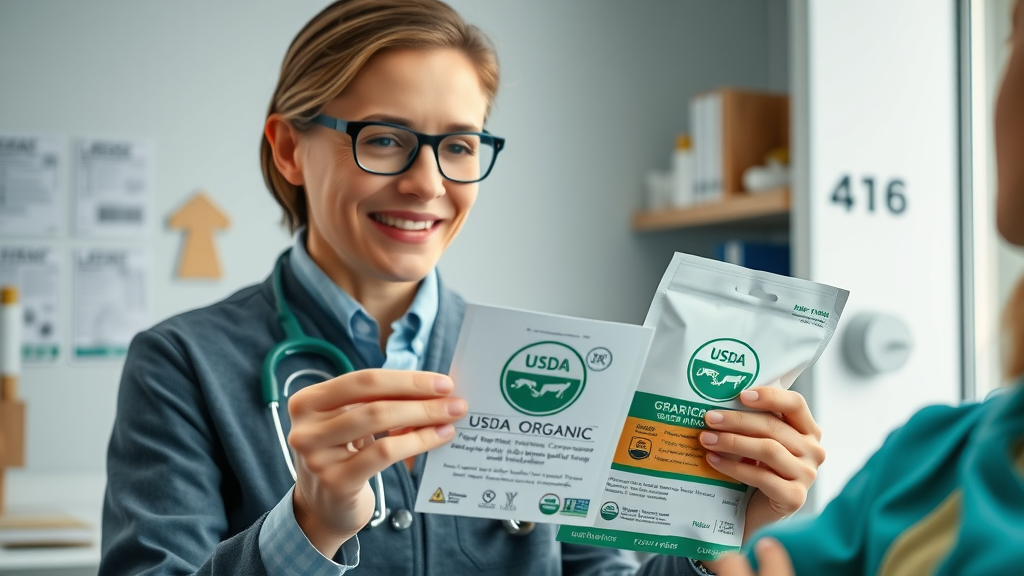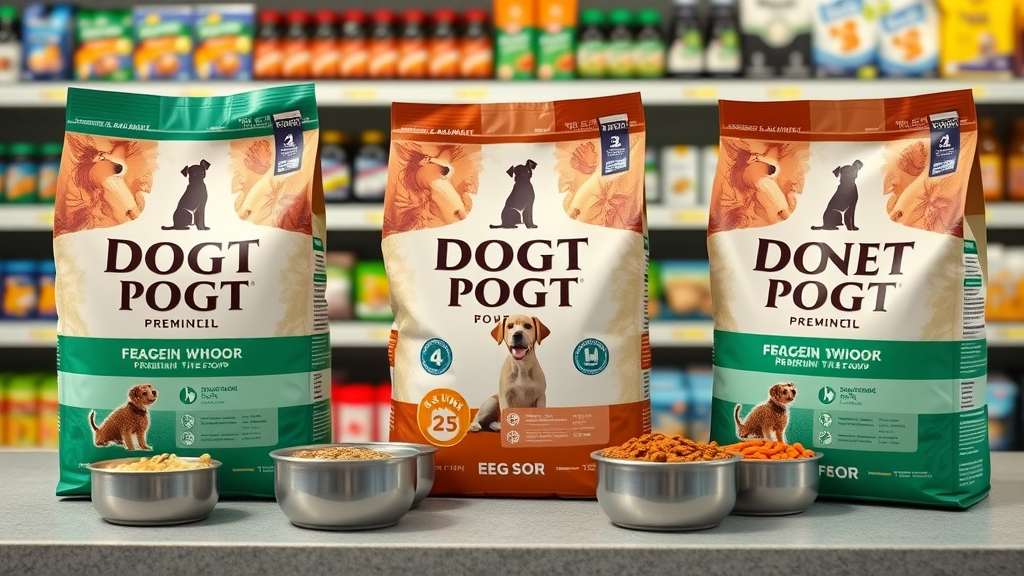Did you know that dogs fed with organic dog food experience up to 30% fewer health issues compared to those on conventional diets? Increasing numbers of pet parents are turning to organic options not just as a diet fad, but as a way to invest in their furry companion’s long-term health. This article will unravel the surprising benefits, real-world results, practical insights, and must-know tips about choosing organic dog food. Whether your goal is to enhance your dog’s energy, manage a sensitive stomach, or simply offer a higher quality of life, understanding the organic edge can help you make the most informed choice. Read on to uncover how organic dog food could be the game-changer for your pet’s vitality today.
- Key differences between organic and conventional dog foods
- Core ingredients and nutritional standards of the best organic brands
- How to transition to organic dog food without digestive upset
- Answers to top organic dog food FAQs
- Veterinary insights, owner reviews, and shopping tips
The Surprising Truth: How Organic Dog Food Can Drastically Reimagine Your Pet's Well-Being
The buzz about organic dog food is more than hype—there’s growing research that highlights its transformative effects on canine health. Unlike conventional dog foods laden with fillers and artificial additives, organic diets use certified organic ingredients like organic chicken, organic vegetables, and whole grains. These ingredients are cultivated and processed without synthetic pesticides, antibiotics, or growth hormones, reducing your pet's risk of chemical exposure.
For dogs with a sensitive stomach , the switch to organic dog food often means improved digestion, fewer allergic reactions, and a shinier coat. Studies have started to trace long-term benefits including a stronger immune system, increased vitality, and extended lifespan. Many pet parents report that their dog’s demeanor, activity levels, and overall energy improve within a few weeks on a new meal plan built around organic foods. The impact goes beyond the visible—holistic formulas support cognitive and cellular health, too, laying the foundation for lasting well-being.

Startling Statistics: The Link Between Organic Dog Food and Extended Lifespan
"A 2022 study found that dogs fed with organic dog food experience up to 30% fewer health issues than those on conventional dog foods."
This statistic is just the tip of the iceberg. Several independent studies now show that a diet comprised of organic ingredients —especially protein from organic chicken and nutrient-packed organic vegetables—can directly reduce chronic inflammation, obesity, and allergies in canines. Moreover, pet food safety monitoring organizations note a lower rate of chemical or contaminant recalls in certified organic brands. Choosing organic aligns with not only prolonging your dog’s lifespan but also enhancing everyday quality of life, which every pet parent desires.
For owners questioning the expense or the effort of changing dog foods, these figures offer persuasive evidence. The initial investment in organic food can mean fewer vet trips down the road and, ultimately, a happier, healthier companion. Such improved health outcomes add quantifiable value to what may otherwise seem like a premium purchase.
What Sets Organic Dog Food Apart? Key Characteristics and Health Benefits
- Certified organic ingredients with no artificial fillers
- Higher nutritional value from organic chicken, organic vegetables, and whole grains
- Gentle on sensitive stomach and promotes digestive wellness
- Reduces risk of allergies and food intolerances
Organic dog food isn’t just another trend; it’s defined by strict standards and evident quality improvements. Only food with USDA Organic or equivalent certification guarantees you’re bypassing synthetic preservatives and genetically modified components. This commitment to purity supports a natural pet diet reminiscent of what your dog’s ancestors consumed in the wild—rich in phytochemicals, away from chemicals that can trigger intolerances or chronic illnesses.
Organic Dog Food vs. Conventional Dog Food: A Comprehensive Comparison

Comparing organic dog food to conventional alternatives illuminates the differences that matter most to both pets and owners. Conventional dog foods often rely heavily on by-products, synthetic dyes, and preservatives. These shortcuts can result in increased risk of recalls, more frequent digestive issues, or even long-term health risks like obesity and diabetes.
In sharp contrast, organic foods focus on animal welfare, digestion, and nutrient density. Humane treatment of livestock, sourcing from trusted growers, and verified organic vegetables with superior antioxidant content are par for the course. This not only promotes higher animal welfare standards but also means fewer contaminants enter your dog’s bowl. The result? Science-backed evidence that organic-fed pets enjoy vital health advantages—from a glossier coat to fewer allergy flare-ups and a more balanced digestive process.
| Feature | Organic Dog Food | Conventional Dog Food |
|---|---|---|
| Ingredients | Certified organic, no additives | Synthetic additives, fillers |
| Animal Welfare | Humane, ethical sourcing | Variable quality |
| Allergens/Contaminants | Low risk | Higher risk |
| Price | Higher initial cost | Lower short-term cost |
| Long-Term Health Benefits | Scientifically backed | Less evidence/support |
Decoding Organic Certification: What Does ‘Certified Organic’ Mean for Dog Foods?

The term certified organic means more than just a marketing buzzword—it’s a guarantee baked into every bag. To display a USDA Organic seal, dog food manufacturers must comply with rigorous ingredient sourcing, handling, and production standards. This includes rules surrounding the use of pesticides, synthetic preservatives, and even animal welfare on certified farms. The rigorous transparency extends to packaging, ensuring “organic” truly means what it claims for every pet parent.
For pet food to be labeled as such, at least 95% of its ingredients must be certified organic. Strict processing guidelines prevent cross-contamination and mandate traceability, making sure your dog’s dry or raw food is as authentic as possible. By choosing certified organic, you minimize your pet's exposure to unnecessary antibiotics, growth hormones, and genetically modified organisms—substances that can impact both immediate health and long-term wellness.
USDA Organic, Processing, and Organic Ingredients in Dog Food
- Understanding USDA Organic and how it regulates pet food
- Organic chicken and liver recipe standards
- The role of certified organic vegetables in pet food
The USDA Organic certification process stretches beyond just ingredients. It encompasses everything from farm to final bowl—auditing animal welfare on sourcing farms, upholding sustainability, and prohibiting synthetic chemicals during processing. Whether it’s a translucent chicken and liver recipe or a vibrantly mixed batch of organic vegetables, you’re getting a meticulously regulated product. These standards reassure pet parents that not only is the food healthier but also safe for every bite.
Ingredient Deep Dive: What Makes Organic Dog Food Nutritious?
Organic Chicken, Organic Vegetables, and the Importance of Whole Food Meal Plans

- The power of organic chicken for lean muscle support
- Liver recipe: A nutrient-dense superfood for your organic dog
- Vegetables: Phytochemicals, antioxidants, and benefits
What distinguishes a premium organic dog food formula is the commitment to real food ingredients —not powdered by-products or vague meats. Organic chicken is a standout for supporting lean muscle mass, meeting the needs of all life stages from playful puppies to older companions. Unlike conventional proteins, organic chicken is raised without antibiotics or growth hormones, which translates to purer nutrition in your dog’s bowl.
Just as important in your dog’s meal plan are organic vegetables and liver recipes . The liver delivers essential iron, vitamin A, and amino acids—nature’s “multivitamin” for canines. Fresh vegetables like carrots, peas, spinach, and pumpkin are brimming with phytochemicals, antioxidants, and dietary fiber. This synergy not only boosts immunity but also helps regulate digestion, energy levels, and overall health.
The best organic dog foods include a variety of whole grains for sustained energy, keeping dry matter consistency optimal for easy digestion. When scanning a label, look for diversity in protein and produce, and minimal processing. These characteristics are signals of a brand that prioritizes natural pet nutrition and long-term health.
Formulations and Recipes: Analyzing Leading Organic Dog Foods

| Brand | Protein Source | Vegetables Included | Certification | Suitable For |
|---|---|---|---|---|
| Brand A | Organic chicken | Carrots, peas | USDA Organic | All dog breeds |
| Brand B | Organic beef | Spinach, pumpkin | Certified Organic | Sensitive stomachs |
Choosing between top organic dog food brands comes down to understanding ingredient transparency, ensuring correct protein sources (like organic chicken or beef) and the right blend of organic vegetables for your dog’s activity level and sensitive stomach needs. Always scan for recognizable ingredients, certifications, and recipes tailored for specific dog breeds or health needs.
Some brands emphasize a single-source animal protein for dogs with allergies, while others focus on balanced combinations or offer a “liver recipe” for extra nutrition. For the picky eater, try smaller bags, request samples, and closely monitor your dog’s response. Remember, top performers invest in science-backed formulation and nutritional standards to ensure a complete and balanced diet.
Digestive Health and Allergy Support: How Organic Dog Food Aids Sensitive Stomachs
Natural, High-Quality Ingredients for Dogs With Allergies and Intolerances

"Switching to certified organic dog food eliminated persistent skin allergies for my border collie." – Satisfied Pet Owner
Dogs with sensitive stomachs or chronic allergies often struggle with the synthetic ingredients found in many conventional dog foods. Organic dog food is formulated without common culprits like artificial colors, chemical preservatives, or by-products that can trigger rashes, ear infections, or digestive upsets. Instead, it uses transparent, high-quality organic chicken and vegetables known for their hypoallergenic profiles.
Many pet parents discover that a careful switch to organic food leads to dramatically fewer incidents of vomiting, itching, or soft stools. Because certified organic meals are easily digestible and rich in natural fiber, they support a thriving gut microbiome and reduce the frequency of flare-ups and intolerances. If your dog suffers from food-related reactions, organic recipes are a proven step forward toward lasting digestive wellness.
Furthermore, the inclusion of anti-inflammatory properties from whole veggies and liver recipes in organic foods can soothe skin, promote healing, and encourage healthy coat regrowth. For allergic or sensitive pets, this switch can be a transformation, turning mealtimes from a source of worry into a daily boost of wellness.
The Role of Veterinary Nutritionists in Evaluating Organic Dog Foods
Veterinary Approval, Formulation, and Tailored Meal Plans
- Why consulting veterinary nutritionists matters
- Formulation standards for organic, natural pet nutrition
- Adapting to specialized meal plans for unique health needs
Working with a veterinary nutritionist ensures your transition to organic food meets all of your dog’s needs. Veterinary experts assess not just food allergies, but also factors like activity level, breed, age, and health history—helping you choose between dry food , raw food , or cooked organic options. They ensure each meal plan is complete and balanced , sparing you the guesswork and protecting against deficiencies.
Top-tier organic dog foods partner with veterinary nutritionists during product development, demanding higher standards for protein, vitamins, and micronutrient balance than conventional brands. If your dog has unique dietary restrictions—for example, a specific protein allergy, need for joint support, or a liver recipe rich in B vitamins—these professionals adapt meal plans to accommodate.
When pursuing the health benefits of organic nutrition, expert guidance leads to the greatest success. Don’t hesitate to consult your vet or request a referral to a board-certified veterinary nutritionist, especially if your dog has complex or chronic health needs.
Price, Value, and Where to Buy: Navigating Organic Dog Food Options
Comparing Cost, Quality, and Free Shipping Availability

- Evaluating cost: Is organic food worth it for your dog?
- Finding deals, discounts, and free shipping for top brands
- Long-term savings from healthier pets and fewer vet visits
The upfront cost of organic dog food can be higher, but savvy shopping and considering the bigger picture reveal its real value. Paying more for certified organic foods means you’re investing in cleaner ingredients, fewer additives, and stricter testing, which pays off in your pet’s long-term health. Lower vet bills, fewer medications for allergies, and a better quality of life translate into significant savings over time.
Take advantage of free shipping promotions, subscriptions, and online bundle deals from reputable retailers. Many brands offer sample packs or introductory discounts so you can try a variety of organic chicken , liver recipe , or dry food options before committing. Read reviews and look for brands that back their claims with science and real pet parent testimonials.
Keep in mind, a better diet also means improved energy, reduced shedding, and potentially fewer digestive upsets—all contributions to savings and a happier daily life with your pet. The right organic meal plan is a wise investment for proactive pet parents.
Taste, Texture, and Palatability: Will Your Dog Love Organic Food?
Raw Food, Dry Food, and Cooked Meal Plan Choices
- Dry food vs. raw food for different life stages
- Transitioning your organic dog to a new meal plan
- Success stories: Fussy eaters thrive on organic food

The mark of a successful switch to organic dog food isn’t just nutrition—it’s your pup’s tail-wagging enthusiasm at mealtime. Today’s top organic options come in a variety of textures from crunchy dry food to gently cooked meals and raw food formulations, addressing every canine palate across all life stages. Picky eaters often develop a new “love this food” attachment to meats and veggies closer in flavor and texture to real food, rather than uninspired, overly processed alternatives.
Transitioning to a new meal plan requires patience: Start by mixing increasing portions of the new organic product with your dog’s familiar food, and observe for digestive tolerance or allergic response. Because high-quality organic ingredients are closer to what nature intended, most dogs adapt quickly and may even show excitement for mealtime after just a few days.
For a dog who previously turned up its nose at food or suffered from appetite fluctuations, the vibrant taste and wholesome aromas of organic meals often trigger renewed interest. Owner testimonials consistently celebrate the transformation, noting brighter eyes, increased playfulness, and a more robust appetite as favorite outcomes.
Sustainability and Animal Welfare in Organic Dog Food Production
Ethical Sourcing, Natural Pet Ingredients, and Environmental Impact
- The connection between organic ingredients and sustainability
- Supporting animal welfare via ethical sourcing
- Reducing your pet’s carbon pawprint
Sustainability and animal welfare are at the heart of certified organic dog food production. It’s not just about what goes into your dog’s bowl—it’s about where those ingredients come from. Organic foods ensure livestock are raised humanely, outdoors, and without harmful antibiotics or growth hormones, supporting higher welfare standards across the industry and guaranteeing natural pet nutrition.
Choosing organic means supporting environmentally conscious farming practices—crop rotations, natural pest control, and reduced chemical runoff all factor into a lower environmental footprint. Organic dog food manufacturers are typically more invested in recyclable packaging, waste reduction, and ethical partnerships with local growers and ranchers. These efforts align with the values of mindful pet owners committed not only to their animal’s health but also to the health of the planet.
Making the switch to organic dog food doesn't just feel good —it actually has a measurable, positive environmental effect. As more pet parents make this change, they drive demand for sustainable agriculture, better animal care, and a future where pet nutrition is clean and ethical for generations to come.
Customer Ratings and Real-World Reviews: Do Owners See a Difference with Organic Dog Food?
- Testimonials from owners of dogs with sensitive stomachs
- Before-and-after health outcomes
- Best-rated organic dog food brands

Real-world feedback from pet parents is overwhelmingly positive when it comes to the benefits of organic dog food . Owners of dogs with chronic digestive issues or allergies often share “before and after” stories—detailing reduced vomiting, softer skin, energizing play, and even longer walks. In independent consumer studies, best-rated organic brands score highest on digestibility, taste, and visible improvements in coat and eye brightness.
Testimonials echo the findings of research: happier dogs, fewer medical interventions, and revived energy for dogs who were once lethargic or picky eaters. Some reviews single out specific liver recipe blends or single-protein formulations like organic chicken for their remarkable success in difficult cases. These real-world stories serve as reassurance that the switch is worth it, and that many dogs not only tolerate but thrive on organic nutrition.
When selecting a brand, browse online ratings, expert recommendations, and monitor your own dog’s journey. Expect a period of transition but also anticipate noticeable differences—sometimes as soon as within the first month.
Meal Planning: How to Transition to Organic Dog Food Successfully
Step-by-Step Guide to Shifting Diets Without Upset
- Starting with partial meals
- Monitoring your organic dog’s tolerance
- Transition timelines based on breed and age
A well-managed switch to organic dog food maximizes the benefits while minimizing digestive upset. Begin with a mix: replace just 20–30% of your dog’s current food with the new organic formula, then gradually increase over 7–10 days. Throughout this period, check for positive stool consistency, stable appetite, and absence of skin or gastrointestinal reactions.
Breed, age, and previously existing sensitivities influence your transition timeline. Small breeds or those with known allergies may need a slower changeover, while high-energy dogs often adjust to organic chicken or liver recipes without pause. Patience is key; gradual transitioning also allows you to monitor which recipes or protein sources yield the happiest, healthiest results.
Don’t hesitate to document changes—both positive and negative. Keep your vet or a trusted veterinary nutritionist in the loop and be proactive with questions. Ultimately, every small adjustment gets your pet one step closer to a fully optimized, organic-driven meal plan.
People Also Ask: Unpacking Your Top Organic Dog Food Questions
Is organic food better for dogs?
Answer: Organic dog food is generally superior due to its use of certified organic ingredients, lack of artificial additives, and lower risk of contaminants. Studies highlight improved coat, fewer allergies, and better overall health in dogs fed organically.
Do vets recommend homemade dog food?
Answer: Many vets recommend homemade dog foods only if formulated with veterinary nutritionists to ensure complete and balanced nutrition. Organic and commercial foods often offer greater nutritional oversight and convenience.
What is the healthiest dog food with no recalls?
Answer: The healthiest dog foods with no recalls are often certified organic brands that prioritize quality sourcing and rigorous testing, such as those featuring organic chicken or organic vegetables and adhering to USDA Organic standards.
What dog food does PETA recommend?
Answer: PETA regularly recommends vegan or plant-based dog foods that adhere to strict animal welfare standards, many of which incorporate organic ingredients and certified organic products.
Frequently Asked Questions About Organic Dog Food
- Is there a difference between organic and natural pet foods? Yes. All certified organic pet foods must meet strict USDA standards for ingredients and processing, while "natural" may simply refer to the absence of artificial ingredients and doesn’t guarantee organic sourcing or certification.
- What are the potential risks of switching to organic dog food? The main risks relate to rapid diet transitions—upset stomach, mild diarrhea, or temporary appetite changes. Gradual transitioning and vet guidance minimize such concerns.
- Can puppies eat organic dog food? Absolutely. Many organic brands offer life-stage formulas. Just ensure your selection is labeled “complete and balanced” for growth, and always transition young pets carefully.
- How can I verify if a dog food is truly certified organic? Look for reputable certifications such as USDA Organic on packaging, check ingredient transparency, and review brand details online for proof of third-party audits.
Final Thoughts: Is Organic Dog Food the Right Choice for Your Pet’s Health?
"Choosing organic dog food is an investment in your pet's health, happiness, and the well-being of the planet." – Veterinary Nutritionist
Ready for Change? Explore Leading Organic Dog Food Brands and Start Your Transition Today
- Shop USDA organic dog food with free shipping options
- Request a sample meal plan tailored to your dog's needs
- Consult a certified veterinary nutritionist for personalized recommendations
Take action now—upgrade your dog’s nutrition, support sustainable farming, and see the difference great food makes! Shop leading organic brands, request personalized meal plans, or consult your veterinarian to start this rewarding journey today.
Exploring the benefits of organic dog food can be further enriched by consulting authoritative sources. The article “Organic Dog Food: Is It Better?” on PetMD provides a comprehensive overview of what constitutes organic dog food, detailing the standards and potential health implications for your pet. ( petmd.com ) Additionally, the Dog Food Advisor’s piece, “Is Organic Dog Food Better?”, delves into the criteria that define organic dog food and discusses its advantages over conventional options. ( dogfoodadvisor.com ) These resources offer valuable insights to help you make informed decisions about your dog’s nutrition.
 Add Row
Add Row  Add
Add 








Write A Comment